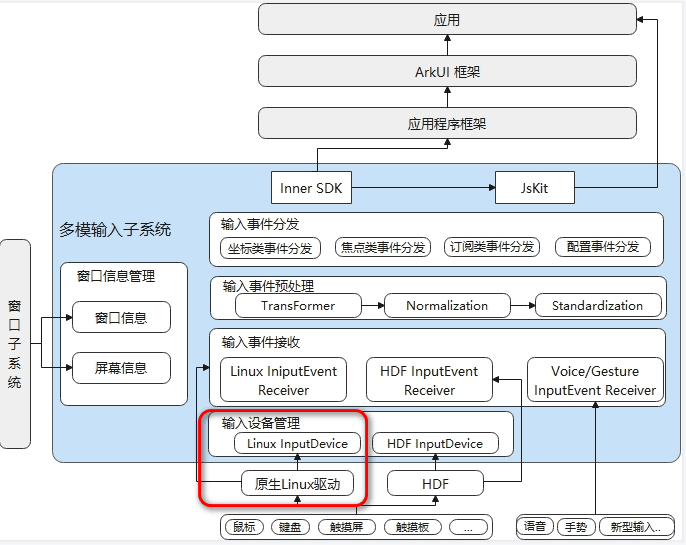Openharmony 多模输入子系统适配方案
Openharmony 多模输入子系统适配方案 HDF 驱动框架 参考如下BlogOpenHarmony-HDF驱动框架介绍及加载过程分析 Openharmony 如何兼容Linux 原生驱动 多模输入Linux标准事件转化成openharmony 标准事件 本节主要讲解红框部分linux 原生驱动与如何转化为多模 过代码分析多模输入里如何将Linux标准事件转化成openharmony 标准事件
Openharmony 多模输入子系统适配方案
Linux设备驱动模型
参考如下Blog
Linux 内核:设备驱动模型 class与device
HDF 驱动框架
参考如下Blog
OpenHarmony-HDF驱动框架介绍及加载过程分析
Openharmony 如何兼容Linux 原生驱动
多模输入Linux标准事件转化成openharmony 标准事件

本节主要讲多模输入如何兼容linux 原生驱动,通过代码分析多模输入里如何将Linux标准事件转化成openharmony 标准事件。
多模输入子系统监听Linux原生驱动流程图

结合代码讲解
MMIService 如何监控lininput 事件
在foundation/multimodalinput/input/service/module_loader/src/mmi_service.cpp 中
bool MMIService::InitLibinputService()
{
if (!(libinputAdapter_.Init(std::bind(&InputEventHandler::OnEvent, InputHandler,
std::placeholders::_1, std::placeholders::_2)))) {
MMI_HILOGE("Libinput init, bind failed");
return false;
} // funInputEvent_ 绑定InputEventHandler::OnEvent
auto inputFds = libinputAdapter_.GetInputFds(); // 接收libinput返回的文件描述符
for (auto fd : inputFds) {
auto ret = AddEpoll(EPOLL_EVENT_INPUT, fd); // 监控返回的文件描述符
.........
.........
}
return true;
}
监听/dev/input 下输出输出节点
void MMIService::OnThread()
{
.........
.........
while (state_ == ServiceRunningState::STATE_RUNNING) {
.........
.........
for (int32_t i = 0; i < count && state_ == ServiceRunningState::STATE_RUNNING; i++) {
auto mmiEd = reinterpret_cast<mmi_epoll_event *>(ev[i].data.ptr);
CHKPC(mmiEd);
if (mmiEd->event_type == EPOLL_EVENT_INPUT) {
libinputAdapter_.EventDispatch(mmiEd->fd); // 事件分类
}
.........
.........
}
TimerMgr->ProcessTimers();
if (state_ != ServiceRunningState::STATE_RUNNING) {
break;
}
}
MMI_HILOGI("Main worker thread stop. tid:%{public}" PRId64 "", tid);
}
代码路径:foundation/multimodalinput/input/service/libinput_adapter/src/libinput_adapter.cpp
void LibinputAdapter::EventDispatch(int32_t fd)
{
CALL_DEBUG_ENTER;
if (fd == fd_) {
MMI_HILOGD("Start to libinput_dispatch");
if (libinput_dispatch(input_) != 0) {
MMI_HILOGE("Failed to dispatch libinput");
return;
}
OnEventHandler(); // 事件转化
MMI_HILOGD("End to OnEventHandler");
}
.........
.........
}
void LibinputAdapter::OnEventHandler()
{
while ((event = libinput_get_event(input_))) {
funInputEvent_(event, frameTime); // 转化为openharmony 对应的系统事件
libinput_event_destroy(event); // 事件分发
}
}
路径: foundation/multimodalinput/input/service/event_handler/src/input_event_handler.cpp
void InputEventHandler::OnEvent(void *event, int64_t frameTime)
{
.........
.........
auto *lpEvent = static_cast<libinput_event *>(event); // 事件转化
CHKPV(lpEvent);
int32_t eventType = libinput_event_get_type(lpEvent);
int64_t beginTime = GetSysClockTime();
MMI_HILOGD("Event reporting. id:%{public}" PRId64 ",tid:%{public}" PRId64 ",eventType:%{public}d,"
"beginTime:%{public}" PRId64, idSeed_, GetThisThreadId(), eventType, beginTime);
if (IsTouchpadMistouch(lpEvent)) {
return;
}
eventNormalizeHandler_->HandleEvent(lpEvent, frameTime);
.........
.........
}
上述函数完成的功能监听 /dev/input 下的驱动节点事件将其转化为openharmony 的系统事件发出。
TP驱动适配方案
方案一 HDF驱动框架适配TP驱动
参考如下Blog
input设备适配HDF框架并和用户态程序交互
方案二 Linux 原生驱动框架适配TP
参考如下Blog
Linux---TP外设调试
补充
适配HDF驱动有如下几点建议:
- openharmony 系统层次直接调用驱动接口则需要适配HDF驱动 (例如应用直接调用系统层接口控制GPIO),不与系统层直接交互(如LCD驱动),可根据项目情况考虑是否适配HDF驱动框架
- openharmony 系统对Linux原生驱动做了兼容处理,可根据项目情况考虑是否适配HDF驱动框架(例如输入输出等)
更多推荐
 已为社区贡献11条内容
已为社区贡献11条内容






所有评论(0)